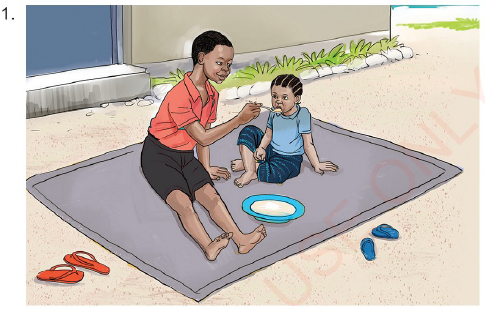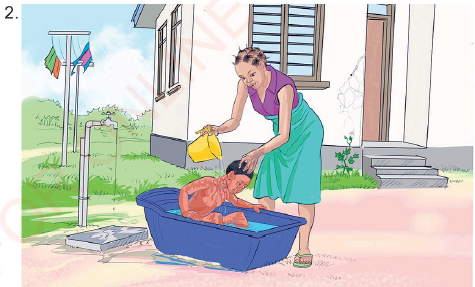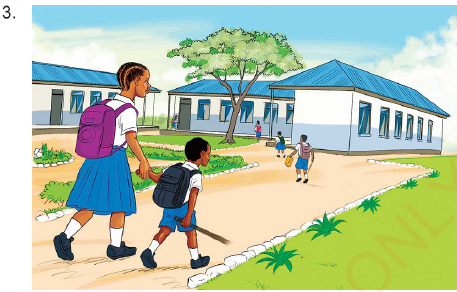Chapter 01 : Loving yourself and others
| In this chapter, you will team acts that show love for family members. including those with special needs. You will also loam to extend such love to members of a large community by respecting them. supporting them, caring for them. and avoiding risky behaviour. |
Acts that show love in the community
There are many acts that show love to yourself and others in the community. Some of the acts include self-esteem and respect to other people, caring for others, protecting others and yourself against the harmful things. Other acts help people with disabilities, sick and elderly.
Acts that show love for our family members
We are responsible for showing love for our family members. Such family members include our parents, guardians, younger brothers, sisters, and other relatives.
| Ask yourself Which acts of love do family members do for you? Which acts do you do to show that you love others? Among the acts that show love for your family is participating in household chores. Which chores do you perform at home? |
Read the following dialogue and answer the questions that follow.
| Sikitu's mother: | How is your family, my friend? |
| Furaha's mother: | Just fine! Is your daughter, Sikitu, doing fine? |
| Sikitu's mother: | She is doing fine! How is Furaha? |
| Furaha's mother: | Honestly, Furaha is doing well and is helping me a lot. Every morning when she wakes up, she washes home utensils, cleans the surroundings, and fetches water before going to school. After coming home from school, in the evening, she waters the vegetable garden and helps me to prepare supper. |
| Sikitu's mother: | You are so lucky! My daughter, Sikitu, is very lazy. She does not do any task at home. She neither sweeps the floor nor washes utensils. I have to wash her clothes and even iron them for her. |
| Furaha's mother: | That is bad! Probably, you are pampering her. |
| Sikitu's mother: | No, my friend! I have tried my level best to guide her but all in vain. She does not understand the instructions at all. |
| Furaha's mother: | Do not give up. Try to stay with her and continue counselling her. Make her your close friend. Show her the benefits of participating in domestic activities. Do this lovingly and consistently. She will slowly change. |
| Exercise 1 1. Which acts done by Furaha impressed Sikitu's mother? 2. Mention other acts that family members should imitate. 3. Which acts of love would you like your family to do for you? 4. If you were Sikitu's friend, how would you help her? |
| Activity 1 Write any other five acts done by family members to show love. Then submit your work to the teacher. |
Caring for family members
There are activities done by family members that show love and care in a family.
| Ask yourself What acts of love do you show for the family members? |
Caring for family members with special needs
Our families are comprised of different people. These include children, youths, and adults. It is important to know their needs in order to support them.
Consider the following actions:
1. A child is cooking for her sick mother.
2. A boy is taking his younger brother to hospital.
3. A sister washes clothes of her sick younger one.
4. Children lift their disabled father and help him to sit in the wheelchair.
5. A child is giving her grandmother some drinking water.
| Ask yourself What have you learnt from these acts? |
Read the following story and answer the questions that follow.
Mr and Mrs Sheuta live in Soni Village in Lushoto District. They have three children, namely Bakari, Sharifa and Amina. Bakari is in Standard Two; Amina is in Standard Three; and Sharifa is in Standard Four. Bakari has a physical disability. Every morning, Sharifa and Amina help their younger brother to cross the road as they go to school. They do the same when they come back from school. The family also stays with their grandmother called Saufa. She is too old to see clearly. Sharifa holds her hand and accompanies her to the bathroom. She also prepares some food and drinking water for her. Amina helps her mother to cook food and wash family clothes. She also teaches Bakari how to read, write, and count.
Exercise 2
1. Which good behaviour have you learnt from this story?
2. What do you do to help family members with special needs?
3. What advice will you give to your fellow pupils who do not take care of family members with special needs?
Helping family members when they face problems
| Ask yourself What will you do in each of the following situations? 1. Your younger brother bleeds after cutting his finger with a razor blade. 2. Your mother suddenly falls sick while you are alone at home. 3. Your younger sister has wetted her shorts. 4. Your sister has lost her exercise book. |
Read the following lyrics and answer the questions that follow.
| Bahati: | Hello brothers and sisters, Here is the message, Relationship means support, Not mere resemblance. |
| Salama: | Why bother? And lie to me! Which kind of support? I don't understand it! |
| Bahati: | Caring for the parents, Once they fall sick, Helping the relatives, Once found in trouble. |
| Zawadi | We console each other, In difficulties, Settle conflicts, Once, they arise. |
| Salama | Now I understand you, I get the point, Let's care for the family, Once in trouble. |
| Exercise 3 1. What message do you get from the lyrics? 2. In what ways can you help your family members when they face problems? |
Activity
Write five good acts you should do for your family members.
Nurturing your younger siblings
Look at the following pictures and answer the questions that follow.
 |
 |
 |
| Figure 1 : Nurturing your younger siblings and little once |
Exercise 4.
1. Which acts are shown in Figure 1?
2. Which among the acts shown above do you practise at your home?
3. What other kinds of behaviour do you practise at your home?,
| Activity Talk with your parents, guardians or relatives about the acts you should do to take care of your younger siblings. Write them at the back of your exercise book. Draw a table indicating the acts of caring for your younger siblings. Then show how many times you do those acts in a week. For example: | ||
| Days of the week | Actions | Frequency |
| Monday to Friday | washing the baby | 2 |
| After a week, submit the table to your subject teacher. | ||
Acts that endanger the safety of the community
It is our responsibility to make sure that family and community members are always safe. It is important to recognize them and avoid acts that can endanger their safety. Such acts include ignoring traffic signs, engaging in child labour and joining groups that use substances such as alcohol, marijuana and the like.
Effects of unsafe behaviour on children
Different kinds of behaviour endanger the safety of children. Read the following dialogue and answer the questions that follow.
| Grandfather: | How are you, my grandchildren? |
| Grandchildren: | We are fine! How are you too, Grandfather? |
| Grandfather: | I am fine as well! Today, let us talk about kinds of behaviour that endanger children's lives. Can anyone mention them? |
| Samata: | Engaging in child labour. |
| Grandfather: | Good Samata! Have you ever seen children engaging in child labour? |
| Selina: | Yes, Grandfather. I have seen many children engaging in child labour. This involves carrying heavy loads, crushing building stones, and mining. |
| Grandfather: | Ah! This is very dangerous for children. What else can endanger a child's life? |
| Fatuma: | Ignoring road traffic signs. |
| Grandfather: | Yes, my granddaughter, Fatuma! You are right. Some drivers ignore road traffic signs as they drive cars and motorcycles. |
| Jacob | So, they can hit children and cause death or permanent disability. |
| Grandfather: | Yes, Jacob! Can you tell us more about risky groups? |
| Jacob | Yes, these include drug users and drunkards, among many others. Also, children can engage in teenage sex. |
| Grandfather | Who can tell us about the effects of teenage |
| Upendo | Girls can get early pregnancy and drop out of school. Also, they can get sexually transmitted diseases such as HIV/AIDS and syphilis. |
| Grandfather | These kinds of behaviour are threatening the lives of children and of other citizens. My grandchildren, I advise you to be obedient. Do not risk your life. |
| Samata | Thank you, Grandfather, for your advice! |
Exercise 5
1. Which kinds of behaviour endanger the lives of children?
2. What are the effects of risky behaviour on children?
3. Which kinds of behaviour among those mentioned in the dialogue above are most dangerous?
4. In your opinion, what kind of advice would the grandfather have given to the children about their safety and security?
5. How would you help your friends to avoid risky behaviour?
Exercise 6
Write TRUE for a true statement and FALSE for a false one.
1 . It is good to do to others as you would have them do to you. . . . . . . . . . .
2. Pupils should only pay attention to the instructions given by teachers. . . . . . . . . .
3. Caring is the best way to teach a lazy pupil. . . . . . . . . . . .
4. Young children, sick, and disabled people need to be attended to. . . . . . . . . . . . .
5. Family members should only help each other during difficulties. . . . . . . . . . .
6. Alcoholism and teenage sex are kinds of risky behaviour. . . . . . . . . . . .
Acts that destroy love in the community
| Think 1 . A pupil throws a stone at a fellow pupil. 2. A pupil is backbiting his or her fellow pupil. 3. A pupil insults a fellow pupil. 4. A child lies so as to get money from his parents or guardians 5. The way you treat others 6. The way you would like others to treat you. |
You might have witnessed some people mistreating others. Mistreatment includes disrespecting, insulting, beating, and injuring other people. It also includes gossiping, using abusive language, cheating, and envying others.
Read the following story and answer the questions that follow.
Shukuru and Sekela are Standard Four pupils at Jitegemee Primary School. Every morning, Sekela is given some money for bus fare and upkeep. Despite being given a sufficient amount of money, Sekela lies to her parents in order to get more money. At school, she buys juice and buns and eats them alone. One day, Shukuru lost his pen and asked Sekela who had two pens to lend him one, but Sekela refused.
During the break, Shukuru likes playing with his friends outside the classroom. They all leave their bags in the classroom. However, Sekela often remains in the classroom because she does not like to play with her friends. One day during the break, Sekela peeped through the window and noticed that no one saw her. She opened Shukuru's bag and stole a ruler. After the break, Shukuru returned to the classroom and he was puzzled to see the zipper on his bag open. When he looked in the bag, he realized that his ruler was missing. He ran to the class teacher's office and reported the loss of his ruler.
The teacher went to the classroom and searched through the pupils' bags. Gosh! The ruler was hidden inside Sekela's bag. The teacher urged Sekela to stop the stealing behaviour. As a pupil, you should learn to respect properties that belong to others. Therefore, you must always do the right thing.
| Exercise 7 1. What kinds of mistreatment are mentioned in the story? 2. What is your opinion about Sekela's behaviour? 3. What will you do to help your friends avoid Sekela's behaviour? 4. What other kinds of mistreatment do you know besides those mentioned in the story? |
| Activity 4 Discuss with your parents or guardians the importance of loving others. Write the conversation in your exercise book. |
Obeying instructions from teachers, parents, and guardians
| Think Have you ever been given instructions by your teachers, parents, or guardians? |
Read the following story and answer the questions that follow.
Mr Shokolo has a daughter called Adila. She is studying at Kirore Primary School. Mr Shokolo always instructs her daughter to fulfil her daily responsibilities before going to school and after coming back from school. Such responsibilities include cleaning the surroundings, washing utensils, fetching water as well as watering vegetables and the flower garden. Other responsibilities include washing and ironing her clothes as well as doing assignments given at school.
Every morning, Adila washes home utensils and cleans home surroundings before she leaves for school. Adila always arrives at school early in the morning, waters her flower garden and cleans the school surroundings. After school hours, Adila returns home early. She waters the garden, irons clothes, and completes assignments given by her teachers.
Adila is a well-mannered daughter such that her teachers, parents, and the community are proud of her.
| Activity List all of your daily activities. Mention the activities you perform in accordance with the instructions given by your teachers, parents, or guardians. Mention the activities you perform without following the instructions given by your teachers, parents, or guardians. |
Vocabulary
Child labour an act of employing a child to perform some activities usually on contract
Community members people who live in a certain area
Counselling give advice to a person on social or personal problems
Impress to make someone feel admiration and respect
Intention desire to do something
Pampering to look after someone very kindly and making him or her feel as comfortable as possible
Risky involving the possibility that something bad or dangerous may happen
Console to make someone feel better when they are feeling sad or disappointed
Exercise 8
1. What kinds of behaviour should be imitated from Adila?
2. What instructions does Adila get at home and school?
3. Why is it important to follow the right instructions that you are given?
4. How would you help your fellow pupils to follow instructions from teachers, parents, and guardians?
5. Mention three benefits of following instructions.
www.learninghubtz.co.tz
Hub App
 For Call,Sms&WhatsApp: 255769929722 / 255754805256
For Call,Sms&WhatsApp: 255769929722 / 255754805256
 For Call,Sms&WhatsApp: 255769929722 / 255754805256
For Call,Sms&WhatsApp: 255769929722 / 255754805256
WHATSAPP US NOW FOR ANY QUERY
App Ya Learning Hub Tanzania






